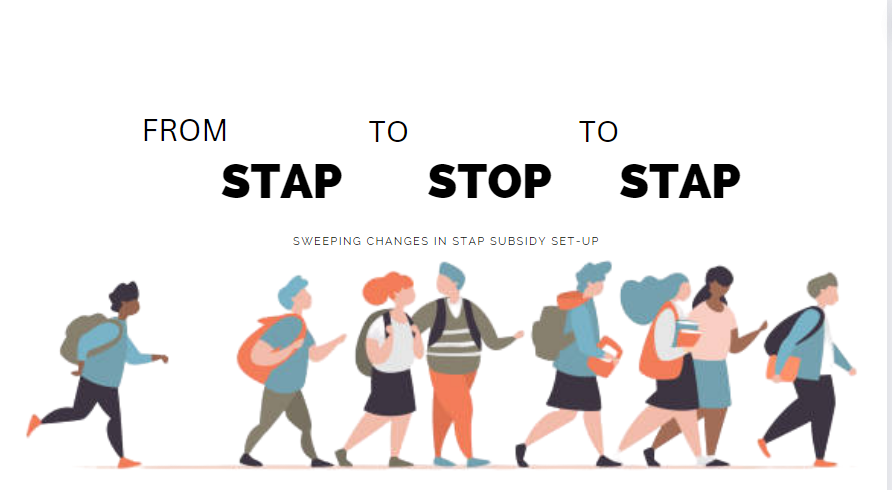
On 6th February 2023, DUO/UWV announced sweeping changes in the STAP subsidy setup
At the end of December, DUO/UWV abruptly canceled the January STAP subsidy round. Many educators we talked to found the tardiness of the announcement quite unforgivable. Thousands of students were affected and businesses as well as (freelance) trainers relying on the January STAP round were left reeling. People did however understand that something had to be done to avoid abuse and make the system more equitable.
And then … there was the 6th February announcement. It contained some pretty sweeping changes. Below you’ll find a summary of the main changes. Further down you’ll find a machine translation of the original document.
Sweeping Changes
In three pages, the DUO/UVW document outlines some sweeping changes:
1. Limiting the number of STAP allocations per course, per educator2. Exclusion of certain courses
3. Changing definitions
4. Publication of STAP allocations per course, per educator
5. Required agreement with the revised STAP budget T&C
Limiting the number of STAP allocations
A limited number of educators have managed to gain a disproportionate share of the total STAP budget. Accessing STAP has been very much part of their business model. In and of itself, that is not a problem but it has led to a situation where certain target audiences were not served because larger educators with significant marketing capability pushed others out of the market. Therefore there will be a limit to the number of STAP allocations per course, per educator.
• In the calendar year 2023, the maximum number of STAP allocations per course will be 300
• Once this 300 threshold is reached, the course will be removed for the remainder of the year from the DUO/UWV database
• Educators are not allowed to upload a comparable course upon reaching the maximum
• As soon as the maximum is reached, this will be announced publicly
Exclusion of certain courses
Before, the minister could only exclude an educator and not a particular course. It transpired that this sanction was sometimes too harsh. Following due process, it will henceforth be possible for the minister to exclude one or more courses from an educator.
Changing definitions
As of 1st May 2023, courses will have to meet inter alia the following criteria:
• The course will have to have a pre-set structure
• An instructor/teacher/facilitator is involved
• Knowledge and skills acquired will have to be tested
The definition of eligible costs has been refined. They may include only:
• Tuition fees
• Examination fees
• Necessary learning materials
Publication of STAP allocations
Details of STAP allocations will be made public. The public (and thus your competitor!) will henceforth know:
• The number of STAP allocations per course
• The total amount allocated per course
• The name and location of the educator
STAP terms & conditions are changing
As it is important educators fully understand the revised STAP terms & conditions, a separate letter outlining the same will be shared.
Original Machine Translated Text
On 6th February 2023, a Newsletter STAP for educators has been released. It contains details about the changes to the STAP budget subsidy scheme and a number of practical matters.
Changes to the STAP budget subsidy scheme
The STAP budget subsidy scheme will be tightened up on a number of points. The purpose of these amendments is to make the regulation stricter and tighter so that abuse and improper use can be prevented and enforcement can be tightened. The experiences in the implementation practice in 2022 are the reason for these changes to the scheme. The following changes are explained below:
• Limitation on the number of extensions per course per educator
• Exclusion from the course
• Definition changes
• Disclosure of Awards
• Agreement with the conditions and requirements of the STAP budget scheme.
You can find the amended regulation here. The amended scheme will enter into force on 7th February 2023.
Limiting the number of extensions per course per educator
A limited number of educators put a relatively large burden on the STAP budget with a number of courses. It also appears that a number of educators use the STAP budget as a revenue model. These educators try to recruit unlimitedly with smart marketing and obtain as much subsidy as possible. This often concerns programs with a large online component and continuous intake moments. In itself, promoting a course that can be publicly financed from the STAP budget is not a problem. But this is undesirable if it means that certain target groups are insufficiently reached with the STAP budget because a disproportionate part of the STAP budget ends up with large providers with a lot of marketing. And if it leads to an impoverishment of the offer for the citizen because educators without a large marketing budget and instructors with a classical offer are pushed out of the market. To prevent this, the number of participants who can follow a training course with a course provider with the STAP budget is limited.
If the maximum number of grants awarded for a course has been reached within a calendar year, this course will no longer be shown in the course register as soon as possible after reaching that limit. The citizen can then no longer apply for a subsidy for this course. However, the citizen will not lose his right to a subsidy if it turns out that the course he chooses has reached the limit.
The allocation per program is made public so that it is clear for which program the limit has been reached. The limit for the 2023 calendar year is 300 extensions per course, per educator. The location where and the form in which the course is given are irrelevant, in RIO terms: counting is based on the course unit and not on the course offered. Finally, grants are counted, not grant applications. Any subsequent cancellations have no effect on reaching the granted limit.
Naturally, the educator is not allowed to enter a comparable training course in the register after reaching that limit and to make it eligible for STAP. The maximum applies to the current calendar year, so programs with a limit will be shown again in the following year and will then be available again for citizens to apply for a subsidy.
Exclusion from the course
If an educator did not meet the conditions of the STAP budget subsidy scheme, the minister could so far only decide to exclude the educator from the course registration and from availability to the subsidy. This is a severe sanction in certain cases, as evidenced by implementation practice with assessment by the STAP Assessment Chamber. It is disproportionate to exclude the educator from the course register because of some incorrect course. That is why there is now also the possibility to exclude per study program. The STAP Assessment Chamber will advise the Minister on such an exclusion after an investigation, in which both sides are heard. The minister will ultimately decide on the actual exclusion. If that is the case, DUO will ensure that the program in question is no longer shown in the register. As a result, citizens can no longer apply for a subsidy for this course. In this case, too, the educator is not allowed to enter a comparable course in the register after excluding a course and making it eligible for STAP.
Definition Changes
Schooling definition
The definition, of course, has been tightened: “course that is given according to a predetermined program, to which a teacher is attached, whereby the acquired knowledge or skills are tested”. This further regulates that there must really be a transfer of knowledge and that, for example, conferences or lectures are excluded. It has been decided to have this change come into effect later than the other parts of this amendment regulation, namely from 1st May 2023. It is conceivable that educators will need time to check whether this change will have consequences for their course offer.
Eligible costs
The definition of eligible costs has also been tightened up in relation to the learning resources: “Eligible costs are: a. tuition, course, tuition or examination fees, as well as costs of learning resources or protective equipment made compulsory by the instructor insofar as these resources are immediately necessary for following and completing the course, provided that the costs of these resources are charged by the educator”.
The STAP Testing Chamber came across that unnecessary teaching packages were offered or that teaching materials were a disproportionately large part of the subsidy. In such cases, there was also a strong promotion to attract as many STAP participants as possible, so that the content of education became secondary. This change regulates that only literature and safety material for the STAP budget are eligible. Another material is the responsibility of the educator or participant. It has been decided to have this amendment take effect immediately as a clarification. This is in line with the earlier explicit statement that gifts are not eligible under STAP.
Disclosure of Awards
The amended regulation includes a provision that makes it possible for information about the STAP grants received to be made public. This concerns the company name and the place of establishment of the educator, the number of awards per course, and the subsidy awarded for this. The reason for this provision is that the STAP subsidy concerns public funds, whereby transparency about the use of these funds is important.
Consent to the conditions and requirements of the STAP budget scheme
The amended scheme stipulates that educators who participate in the STAP budget scheme, i.e. enter training courses in the training register and make them eligible for STAP, thereby declaring that the courses meet the requirements set by the scheme. Because it is important that all educators are aware of the formal and legal consequences of this provision, you will receive a separate letter on this subject.
Invoice at the earliest 3 weeks before the start of the course
According to the STAP budget regulation (article 16, paragraph 2), the educator may invoice from 3 weeks before the start date of the course until 13 weeks after completion of the course. We now see that invoices are billed earlier than 3 weeks before the start date. We ask you to take these 3 weeks into account. The reason for this is that STAP UWV still receives cancellations from citizens. Cancellation of a burger is easier to process if the order has not yet been invoiced. As an educator, this may save you a lot of work, because you do not have to refund the STAP budget. But this is also easier for STAP UWV because we do not have to send a claim for reimbursement.
Refunds can be found in the course portal
If the course is canceled due to force majeure or because the student cancels before the agreed start date, a physical and digital recovery letter will be sent. In this letter, you as educators are asked to repay the STAP budget to the UWV. These sent letters can also be found in the course portal under the tile “Shared documents”. Here you will find all letters that have been sent and where we have not yet received a refund.
Adjustments to the course portal
On 22nd December there was a release on the course portal.
Under the title “Proof of Participation,” you will see more applications than before. At first, you only saw the requests with the status “waiting for delivery”. For these applications, we await the submission of proof of participation. If proof of participation is not (timely) submitted, the status will change from “waiting for delivery” to “under investigation”. Requests with the status “under investigation” are now also shown under the tile “Proof of participation”.
These were not visible to you at first but will now remain visible to you until the investigation has been completed and the status has been changed to "delivered" or "withdrawn". The above also applies to applications that receive the status “under investigation” after you have submitted “Unsuccessful cause citizen” or “Unsuccessful cause instructor”. Prior to this release, it was possible for a “proof of attendance” to be passed while the course activity had not yet started. This is now no longer possible. A 'proof of participation (unsuccessful)' can still be submitted before the start of the course activity, so that an instructor can report a cancellation to UWV STAP.
We have received requests to enable the export of participant data to Excel so that you as an instructor can make selections on this basis. Unfortunately, this has not yet been realised. This is partly because an export requires a lot of capacity from the system. We also want to keep the course portal available to other course providers. A solution is still being worked on.
After 15 minutes of doing nothing in the course portal, the system was automatically logged out. What is new is that a message appears first, after which you are given the option to continue. If you do nothing, you will still be logged out automatically.
Survey
On 2nd February, DUO sent you an email with information about a survey about the operation of the STAP budget subsidy scheme. The survey is being conducted by the research agencies SEOR and Ockham IPS, on behalf of the Ministry of Social Affairs and Employment. We hope you will participate in this survey.
Finally
The next period for applying for a STAP subsidy starts on 28th February. We request that you critically assess the course offer that you qualify for STAP on the basis of the tightening of the regulation. We wish you good luck with the preparations.



